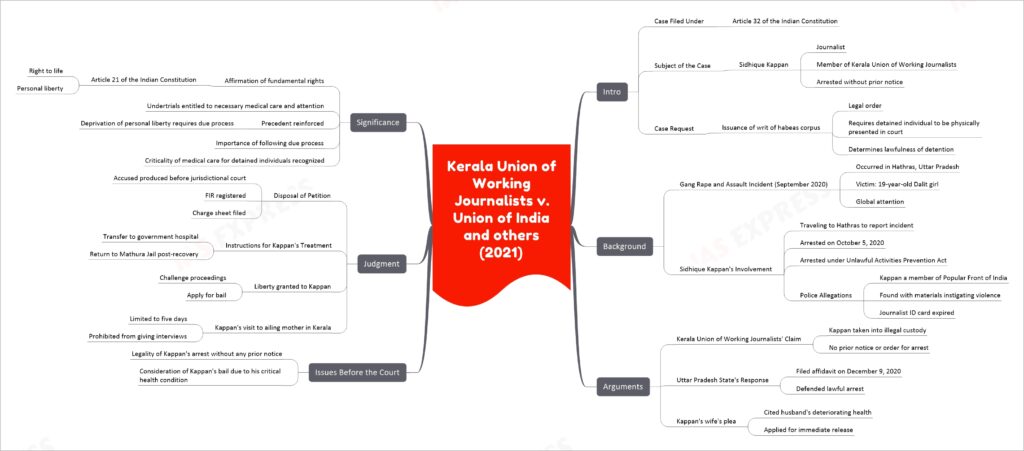Kerala Union of Working Journalists v. Union of India and others (2021): Article 21 in Action
Kerala Union of Working Journalists vs. Union of India was a significant legal case filed under Article 32 of the Indian Constitution. The case sought the issuance of a writ of habeas corpus, a legal order requiring a detained individual to be physically presented before a court to determine the lawfulness of the detention. In this case, the subject was Sidhique Kappan, a journalist and member of the Kerala Union of Working Journalists, who was arrested without any prior notice, as claimed by the petitioner.
Background
The case emerged amidst the fallout of a brutal gang rape and assault incident that took place in September 2020 in Hathras, Uttar Pradesh. The victim was a 19-year-old Dalit girl, and her brutal demise caught global attention. Sidhique Kappan was traveling to Hathras to report on this incident when he was arrested on October 5, 2020, under the Unlawful Activities Prevention Act. The police claimed that Kappan was a member of the Popular Front of India and found him with materials that could instigate violence. They further alleged that his journalist ID card was expired.
Arguments
- The Kerala Union of Working Journalists filed a writ petition claiming that Kappan was taken into illegal custody without any prior notice or order. However, the state of Uttar Pradesh opposed this claim and filed an affidavit on December 9, 2020, defending the lawful arrest.
- During the proceedings, Kappan’s wife, citing her husband’s deteriorating health, applied for his immediate release.
Issues before the Court
Key issues before the court included:
- The legality of Kappan’s arrest without any prior notice.
- The consideration of Kappan’s bail due to his critical health condition amidst the ongoing litigation.
Judgment
- After hearing all the arguments and considering the medical records, the Supreme Court found it prudent to dispose of the petition as the accused was produced before the jurisdictional court, an FIR was registered, and a charge sheet filed.
- However, the court ruled that Kappan should be transferred to a government hospital for treatment.
- After his recovery, he would be moved back to Mathura Jail, with the liberty to challenge the proceedings.
- The court ruled that Kappan had the liberty to approach court for bail or to challenge the proceedings.
- The court also allowed Kappan to visit his ailing mother in Kerala for five days, barring him from giving any interviews during this period.
Significance
The case affirmed the fundamental right to life and personal liberty as per Article 21 of the Indian Constitution, highlighting that even undertrials are entitled to necessary medical care and attention. It reinforced the precedent that no individual should be deprived of their personal liberty except according to the law’s due process. Thus, the case underlines the importance of following due process in all circumstances and recognizes the criticality of medical care for detained individuals.
This article is part of the series “Landmark Judgements that Shaped India” under the Indian Polity Notes & Prelims Sureshots. We aim to make the articles comprehensive while leaving out unnecessary information from the UPSC perspective. If you think this article is useful, please provide your feedback in the comments section below.


